Green Energy Is Now As Cheap As Fossil Fuels
Fossil fuels are the energy of the past
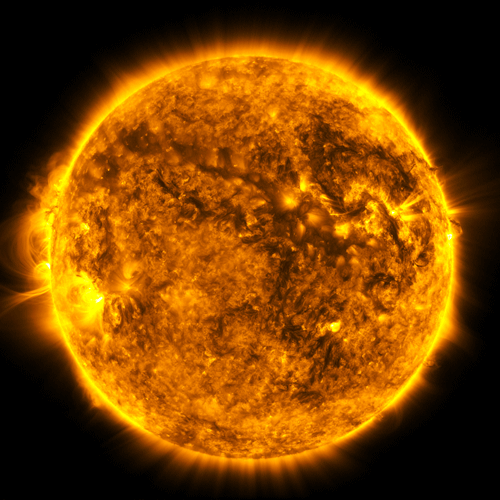
Renewable energy is now as cheap as fossil fuels, without the added cost of destroying human civilization. Between 2010 and 2017, solar and wind costs decreased by 81% and 62%, respectively. These are dramatic gains, making green energy immediately competitive with fossil fuels. In the long-term, it’s like choosing between a coffee and crystal meth. Both will wake you up, but one will make your teeth fall out.
I’ll take the coffee, please.
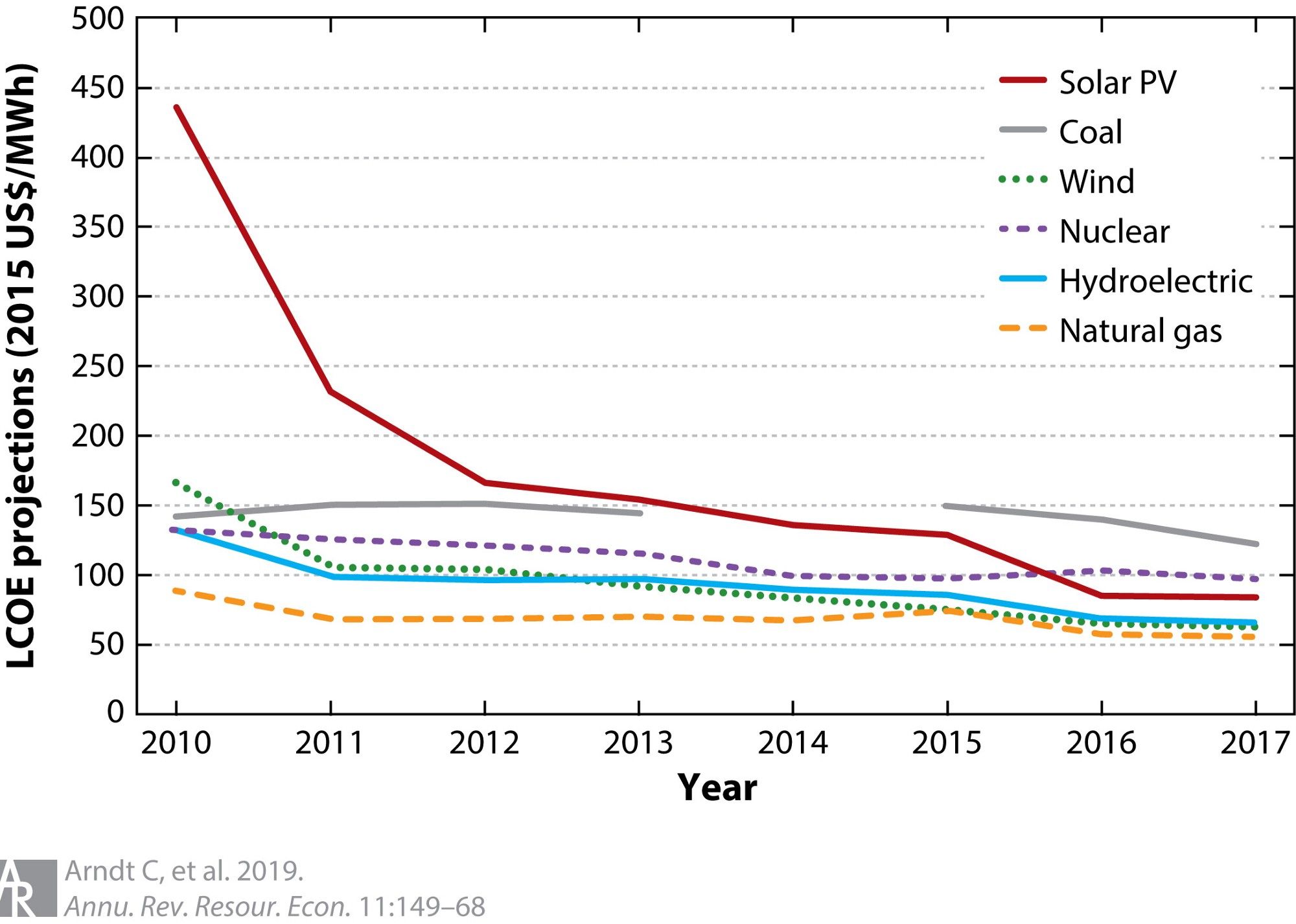
As you can see in the graph above, wind and especially solar prices have dropped dramatically, far ahead of predictions.
And investments are following. Renewables are now 61% of net capacity additions globally. In the US alone, the green economy has already created 10 times as many jobs as fossil fuels. In South Africa, they’re looking at a million new jobs from renewable energy by 2050.
Developing countries are increasingly leapfrogging past 1800s era fossil fuel technology straight into renewables. They allow for a more distributed grid and use a resource every country has — sun and wind.
This is obviously the future, and the complaints of the fossil fuel industry are about as relevant as the whale oil industry in the 1900s. Green energy isn’t just the non-suicidal choice for our grandchildren, it’s the economic choice right now.
The Great Price Drop
Throughout this piece, I’ll reference a study by Arndt, Arent, Hartley, Merven, and Mondal in the Annual Review Of Resource Economics. Here’s Hartley talking about their results:
Renewable energy is now comparable with the cost of building new coal and nuclear capacity.
This has changed the landscape. There is now a cheap, clean alternative for power generation. There’s no longer this problem of do we decarbonize our power sector and have more expensive electricity — in which case it negatively affects our economy. We’re now finding that because it’s cheaper, it’s actually beneficial to produce greener electricity. (Knowable Magazine)
To reach this conclusion, they reviewed the levelized cost of electricity (LCOE) across multiple energy sources. Renewables are dropping the fastest. The interesting thing is that early projections consistently didn’t see this happening. Analysts saw renewables continuing to be expensive.
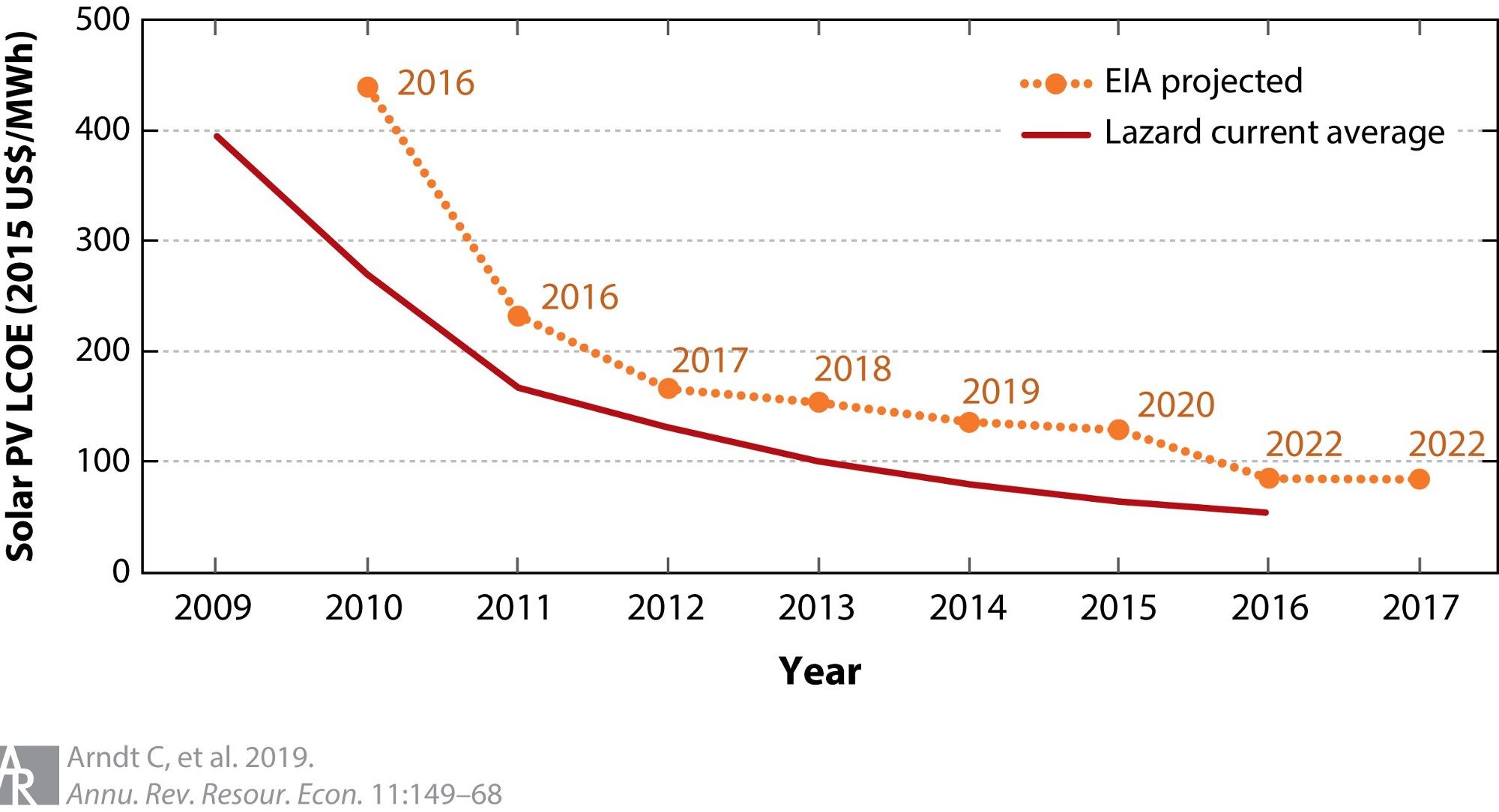
The red line shows the drop in average solar costs. The orange (on a different time scale) shows what the US Energy Information Administration projected costs to be in different years. By 2016, costs had already collapsed to projected levels for 2022, one-fifth of what the estimate for 2016 was. Unusually for any infrastructure project, renewable energy has come in early and well under budget.
The Change In Investment Flows
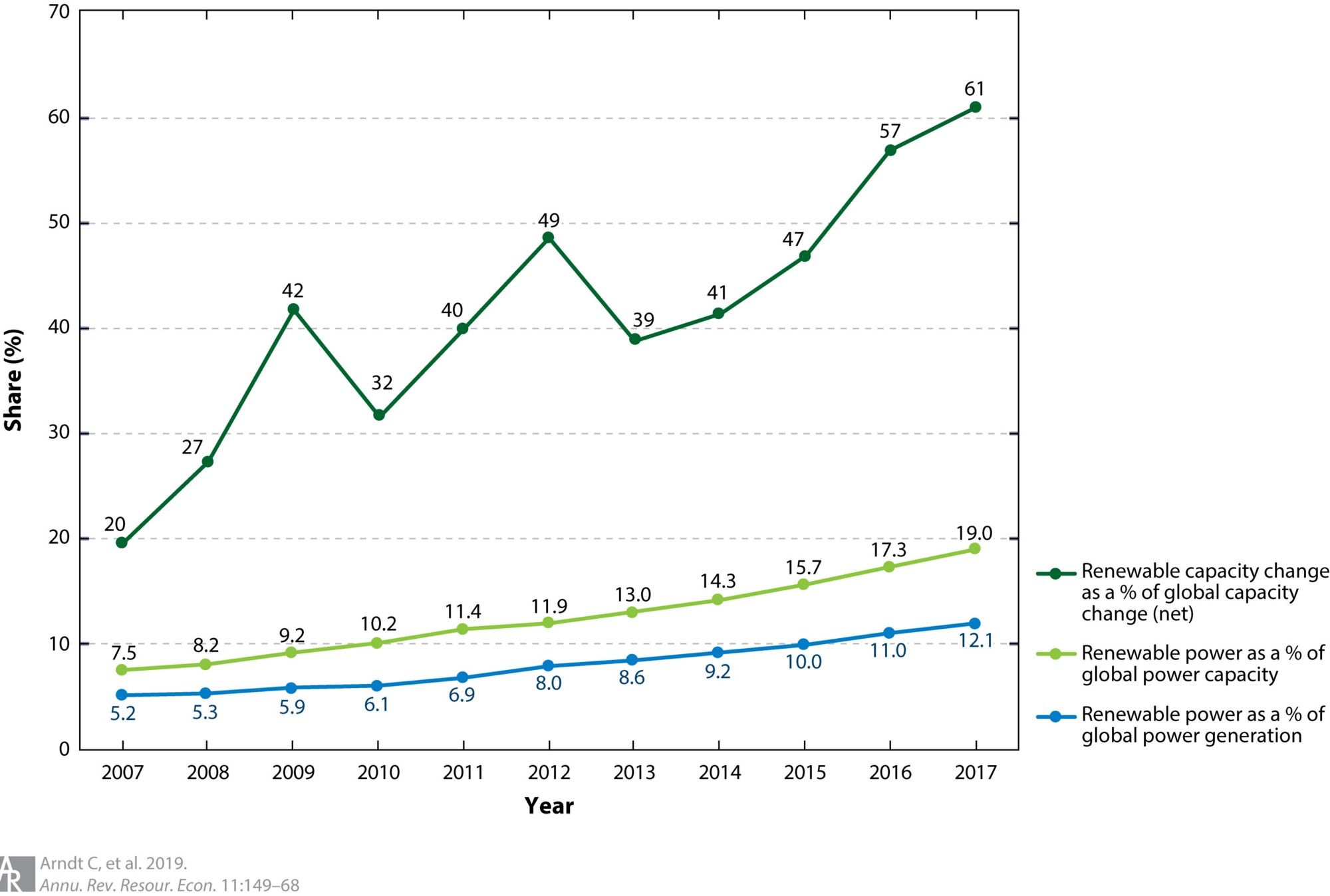
In the same time period, we went from 20% of new capacity being renewables to 61%. Honestly, to even come near 2° of warming (which still ruins my island life), we renewable energy needs to be 100% of new capacity, and any fossil fuel development needs to be surrounded with pitchforks.
What this has meant is that renewable power has gone from 5.2% of global power generation to 12.1% by 2017. And rising.
This isn’t altruistic behavior, it isn’t a sacrifice for our grandchildren’s future as renewable energy is portrayed to be. Green energy is cheap now. Given that the long-term bill for fossil fuels is death, green energy is actually much cheaper.
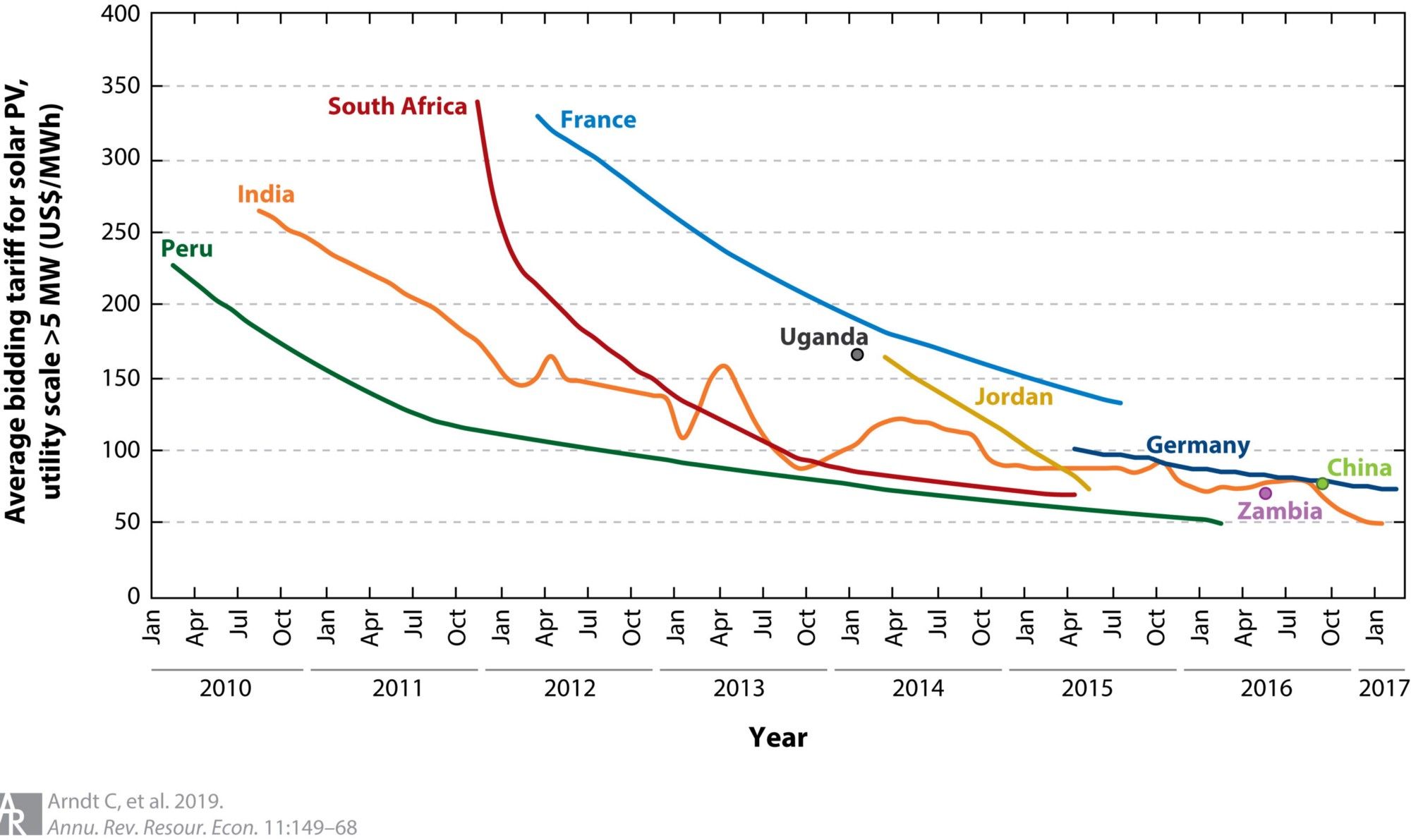
The Opportunity For Developing Countries
Climate delayers have said that we need to keep fossil fuels for developing countries, to lift people out of poverty. But this is a lie. We really don’t. While we will need more innovation to replace fossil fuels in flights and cement and steel production, for the majority of uses, it makes sense to switch to renewables now. Especially for developing countries.
As Hartley says:
In many developing countries, not everyone has access to electricity, because the infrastructure required to connect them to the system is not available. Renewable technologies can allow countries to skip the need of having extensive power grids, as energy production can be developed closer to centers of demand and, in the case of solar, can even be placed on people’s roofs. (Knowable)
This is the case where I live, in Sri Lanka. God knows it’s hot enough, and we have solar panels on our house. For an upfront investment of about $10,000, we never have to pay electricity bills again. We — a private house — pump all that energy back onto the grid and get equivalent credits for it.
Rather than building one giant power plant (with all the usual corruption) and then continuing to buy fossil fuels from dodgy countries that are getting into wars and boycotts all the time, we can just use our own sun on our own land. Besides the technical costs, I think this fact is often ignored. Very few countries have fossil fuels, but every country has renewable energy.
The Issue Now
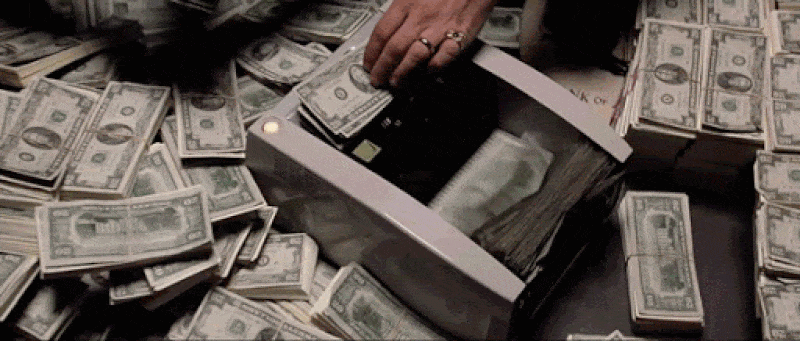
The issue now is not cost, which is increasingly cheaper than fossil fuels. Like Scarface, the trouble is what to do with all that energy. What scientists call systems integration. If you’re getting a ton of solar power during the day, what do you do at night? How do you balance it with night time wind, or do you need to adjust demand patterns?
Hence it’s not just a price thing. There still have to be smart policy prescriptions to make this work, but any of this is better than the systems disintegration that comes with climate change. I live on an island, and if we continue using fossil fuels every beach I know will simply disappear. Most of our coastal cities and homes will be inundated.
You’d think that this apocalypse would be enough to shift but no, people are still like, ‘but can I save $10 now?’ Luckily, yes you can. Green energy is already cheaper than black energy, and it will only get more so as technology improves. Meanwhile ongoing divestments and pressure on the 100 companies and 33 banks that profit from fossil fuels are making them increasingly bad investments.
Investment literally means to allocate money for a benefit in the future. The future is renewable energy, and the future is today.
Faster Than You Think: Renewable Energy and Developing Countries. Annual Review of Resource Economics
Vol. 11:149–168 (Volume publication date October 2019)
First published as a Review in Advance on June 10, 2019
https://doi.org/10.1146/annurev-resource-100518-093759